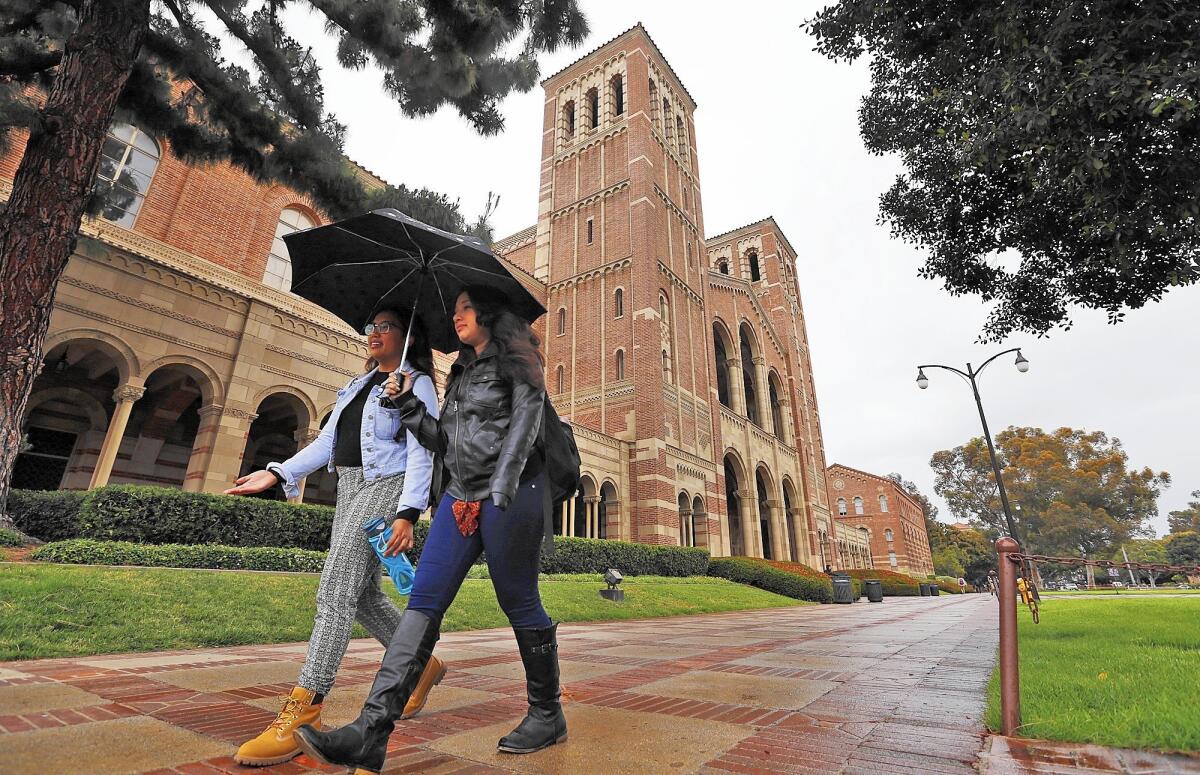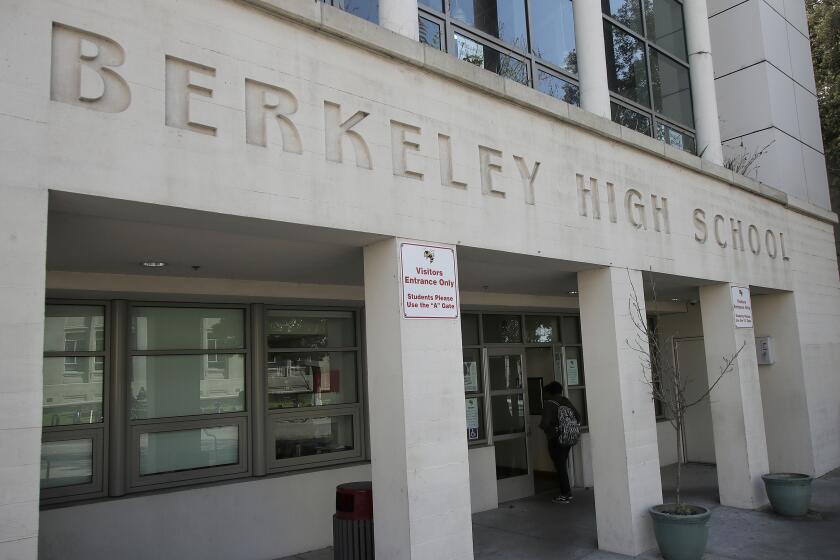UC law students celebrate exemption from supplemental fee increases

At
What was in effect a footnote in Gov. Jerry Brown’s recent proposed budget for the University of California has turned into a cause for major celebration among UC law students.
Surprising many faculty, Brown and the UC regents have exempted the four law schools on UC campuses from the fee increases being imposed in the fall on about 50 other professional graduate school programs such as medicine, dentistry, business, public health and social work.
The increases in the so-called professional degree supplemental tuition originally were to be between $1,058 and $1,587 a year for in-state law students at UCLA, Berkeley, Davis and Irvine, according to a plan the UC regents had approved in November. That would have increased overall tuition and fees for a Californian at UCLA’s law school, for example, to more than $46,000 a year, including the basic charges all UC students pay. (Non-Californians usually pay somewhat more.)
However, Brown thought that law students already had seen costs escalate too fast in recent years and that they faced too much debt compared to potential earnings, a spokesman said. As a result, the budget agreement between Brown and UC President Janet Napolitano included what some officials described as a rare exemption for law schools from the professional tuition increases; it also froze tuition for in-state undergraduates for two years and raised it about 5% for out-of-state undergraduates.
Geneva Thompson, who is going into her third year in the fall at UCLA’s law school, described the tuition freeze for law students as “wonderful because we are paying a ton already for our degrees.” And it may encourage more students worried about loan debt to enter public service law careers rather than the higher-paid corporate jobs, she said. She estimated that she will owe about $150,000 in student loans by the time she graduates and starts seeking public sector jobs involving water-related law.
Yet, while law students are happy, they also feel “it would be nice if all the graduate programs were given the same treatment because they are paying a ton as well,” said Thompson, who is 25 and the outgoing president of the Native American Law Student Assn. at UCLA
Relieved that Brown is proposing substantially more state funding for University of California than he previously did, the UC regents last week agreed to the law school exemption even though it means law schools will have less revenue than they had anticipated. Some officials said they privately wondered whether Brown, who graduated from Yale’s law school and was the state attorney general, might want to help law students since he personally identifies with them — a theory that a spokesman for the governor said was not true.
H.D. Palmer, a spokesman for Brown’s Department of Finance, said that the governor felt that “higher fees aren’t appropriate at this time” at law schools. He cited a UC report showing that law schools often are the most expensive at UC campuses and that about 85% of UC law students take on debt. The average debt for 2013 graduates was $119,000, about double what it was in 2001, he said the report showed.
The last few years have brought concern and change to legal education nationwide. As the recession and technology reduced the number of new well-paid jobs for new lawyers, many schools across the country reported drops in the number of applications. About half reduced the size of their incoming classes, according to a 2012 survey conducted by Kaplan Test Prep.
Unlike undergraduate studies, graduate and professional school costs at UC vary greatly by discipline and campus. In general, all graduate students must first pay the basic $12,200 in tuition and then some pay additional “professional degree supplemental tuition.”
Originally, Brown sought to block all those supplemental fees. But as part of the budget agreement, the regents are sticking to their past vote to raise supplemental fees in 44 programs, most by about 5%. On the low side, for example, it will rise $144, or 2.5%, to $5,886 a year for in-state students in preventive veterinary medicine at UC Davis; on the upper end, it will increase $1,928, or 5%, to $40,476 for a Californian seeking a graduate business degree at UC Berkeley.
The extra fees for nursing programs at the UCLA, Davis, Irvine and San Francisco campuses are to increase 20%, or $1,671, to $10,029. And five other graduate degrees, including journalism at Berkeley and public policy at Riverside will see supplemental charges for the first time.
The state Legislature has to come up with a final budget by next month, but the UC tuition plans are controlled by the regents and are unlikely to be altered by further action in Sacramento. So the law schools’ supplemental increases, which were to range from 3.1% at Davis to 5% at UCLA and Irvine, are canceled, officials said.
“There is definitely a sigh of relief that tuition is staying steady,” said Kareem Aref, who just finished his first year at UC Davis’ law school. But the celebration is brief, he added, “since we realize how much we are paying for these degrees in the first place.”
Aref, who is 21 and served as the president of the systemwide UC Student Assn. when he attended UC Riverside as an undergraduate, said he receives substantial financial aid but expects to finish law school with about $100,000 in student loans. He wants to work in a district attorney’s office and “do some good in the world,” but he knows that some fellow students feel they can’t take a public service path because of their loan burden.
UCLA Law School Dean Rachel F. Moran said in a statement that the school will compensate for the lost revenues by continuing “cost saving measures and we also continue to turn to our alumni and friends for critical support of scholarships, student services, and programming.”
Steve Montiel, a spokesman for the UC system, said the regents and administrators are pleased with the budget agreement and “are confident that the leadership of our law schools will find ways to ensure that current and future UC law students will experience the same level of educational quality and access as past students.”
Twitter: @larrygordonlat
More to Read
Start your day right
Sign up for Essential California for news, features and recommendations from the L.A. Times and beyond in your inbox six days a week.
You may occasionally receive promotional content from the Los Angeles Times.







